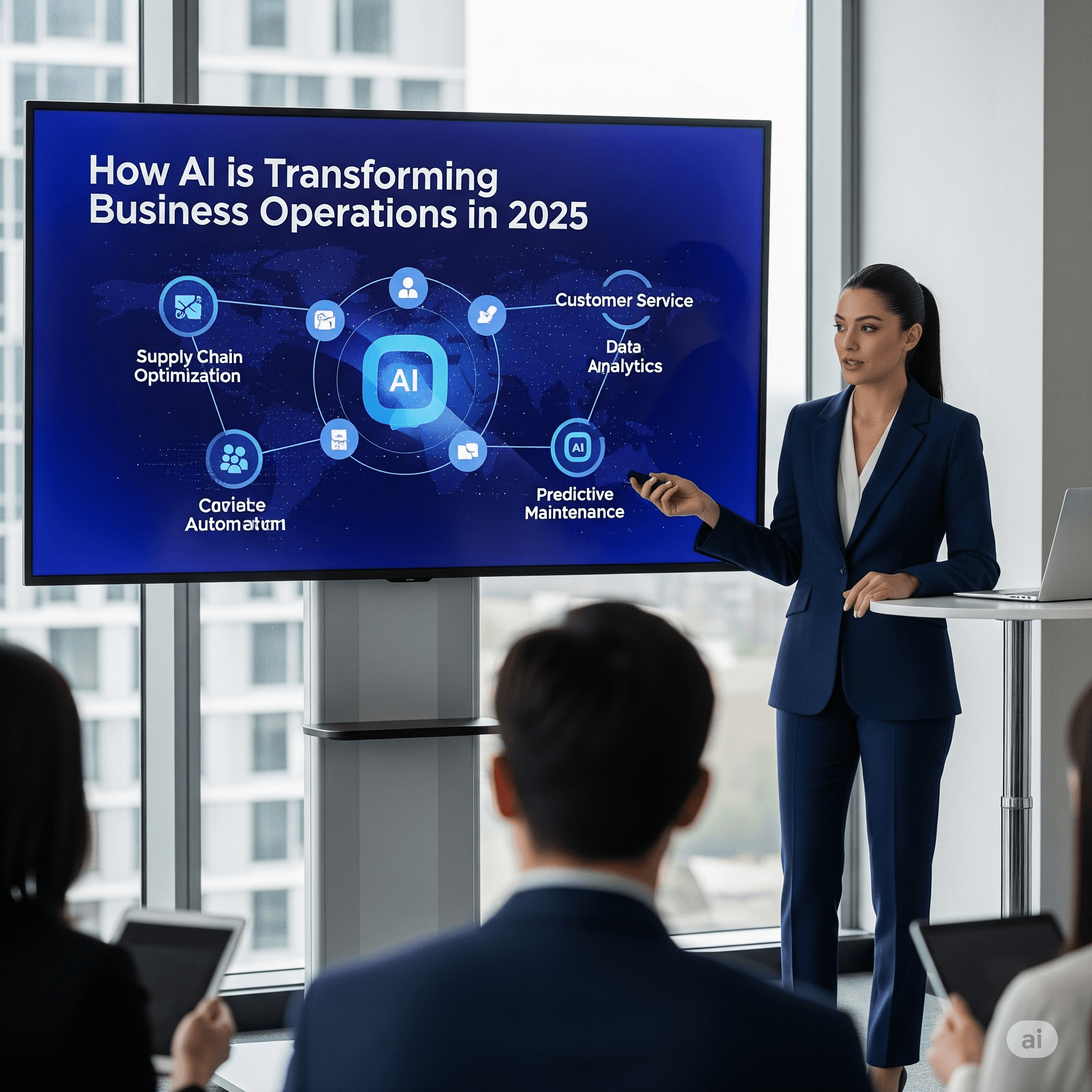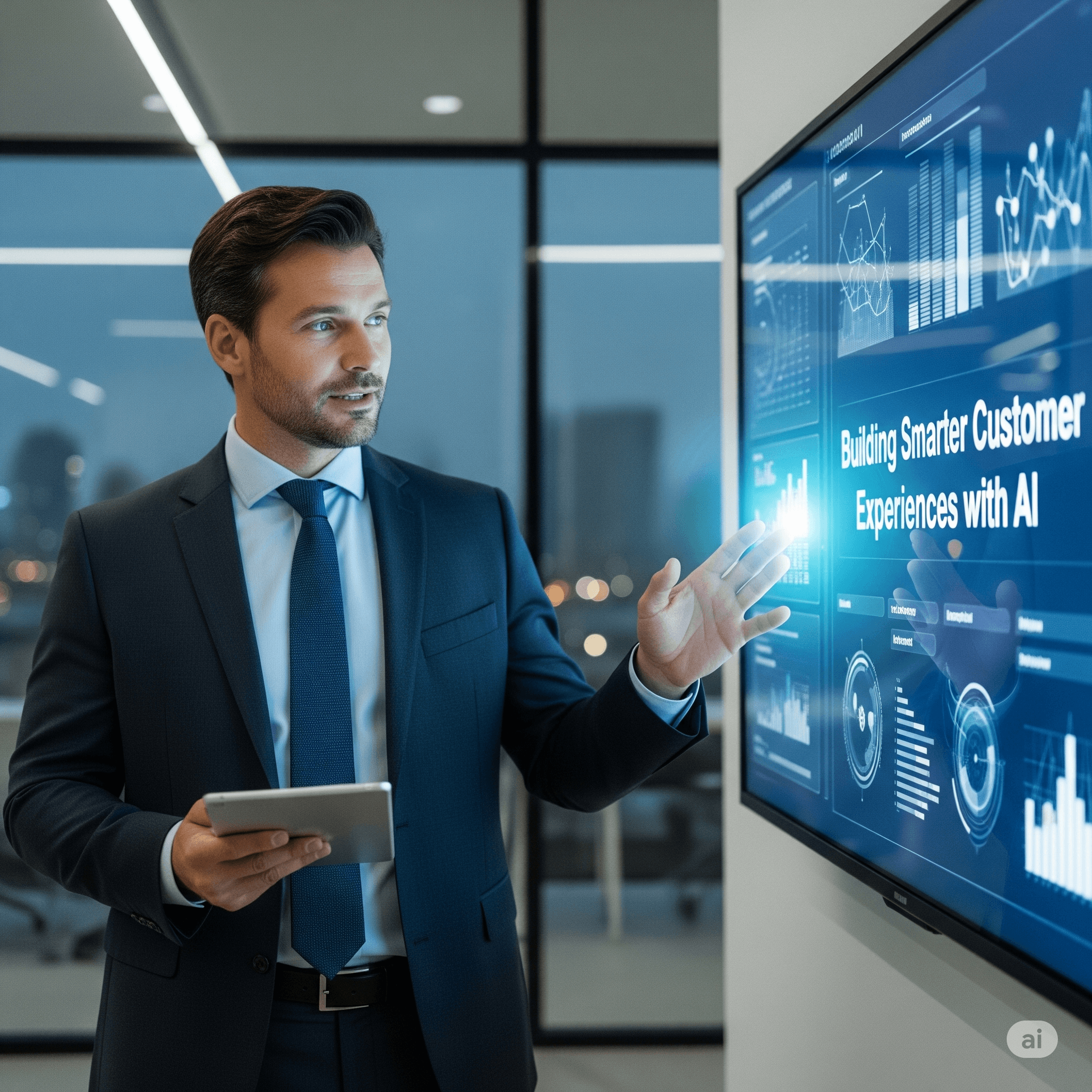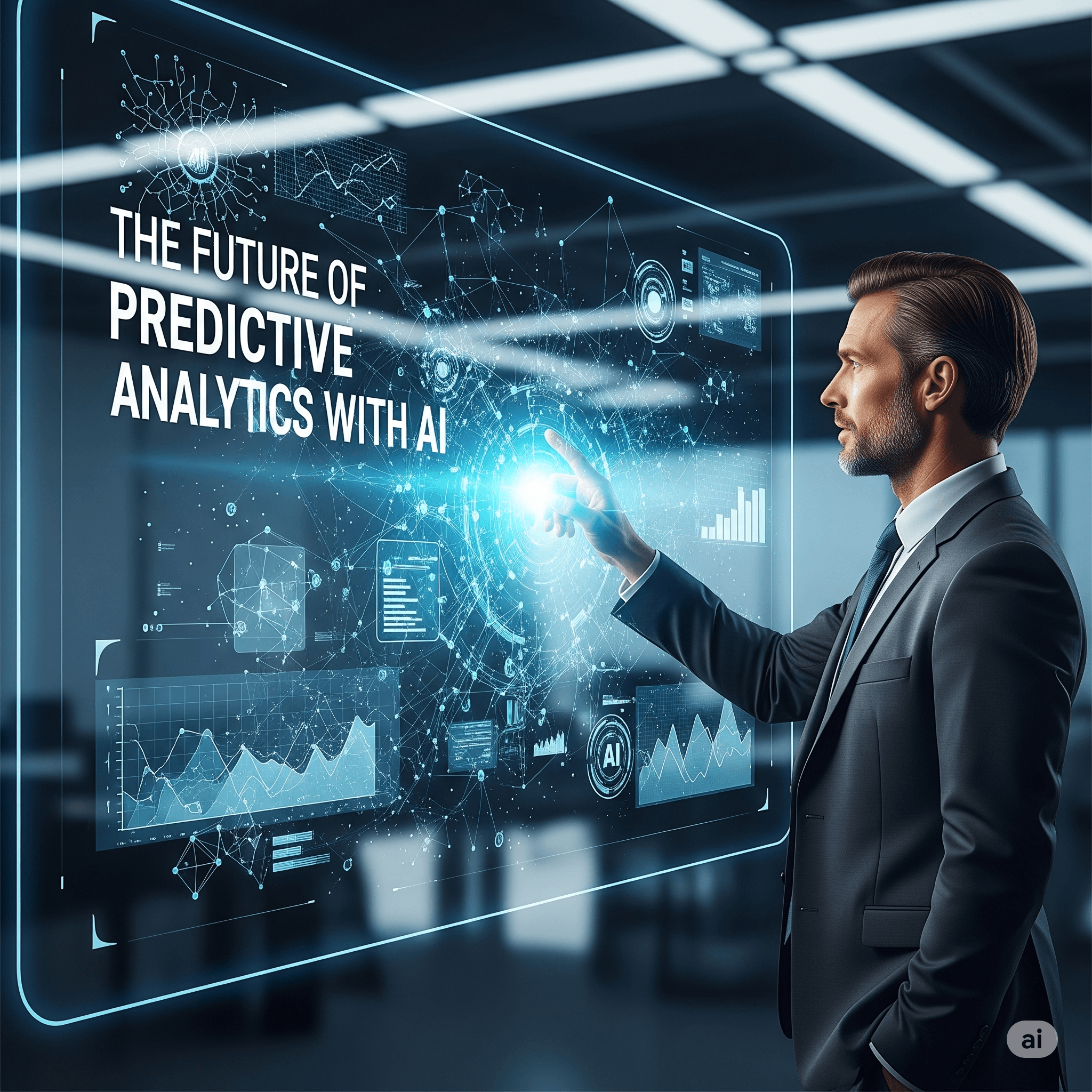How AI is Transforming Business Operations
Discover how artificial intelligence is revolutionizing business operations across industries through intelligent automation, predictive analytics, enhanced decision-making, and data-driven insights that drive efficiency, reduce costs, and unlock new growth opportunities.

Introduction
The AI Revolution in Business Operations
Artificial Intelligence is revolutionizing business operations through five core advantages that are reshaping how organizations function and compete. First, AI drives end-to-end efficiency by streamlining workflows, enhancing resource allocation, and enabling predictive maintenance that leads to substantial cost savings. Second, it elevates decision-making quality by complementing human intelligence with data-driven insights and pattern recognition capabilities that humans might miss. Third, AI accelerates innovation by identifying market opportunities and enabling rapid development of new products and services through unique analytical approaches. Fourth, it empowers the workforce by automating routine tasks, allowing employees to focus on strategic work while creating more inclusive opportunities. Finally, AI enables superior customer experiences through real-time personalization, round-the-clock support, and intelligent service routing.

AI Adoption Statistics
Research covering 152 AI projects and 250 executives reveals that process automation represents 47% of AI projects, making it the most cost-effective and easiest to implement, providing quick ROI while freeing staff for more complex work.
Intelligent Process Automation and Task Management
Intelligent Process Automation (IPA) represents the most immediate and impactful way AI is transforming business operations, using advanced algorithms combined with robotic process automation to handle complex, judgment-based business processes with enhanced accuracy and speed. Unlike traditional automation that follows predetermined rules, AI-powered automation can adapt to variations, make decisions based on context, and continuously improve through machine learning. Organizations are implementing AI automation across diverse functions including document processing, data entry, invoice handling, customer service responses, and compliance management, with some companies reducing report preparation time from several days to just one hour.
- Robotic Process Automation (RPA): AI-powered bots automating routine tasks like data entry, invoice processing, and customer service responses with 24/7 availability
- Document Processing: Intelligent systems extracting, analyzing, and processing documents with accuracy rates exceeding human performance
- Administrative Automation: AI handling scheduling, report creation, and workflow management while providing real-time monitoring and alerts
- Financial Process Automation: Automated financial audits, compliance management, and transaction processing with enhanced fraud detection
- Quality Control Automation: AI-powered visual inspection systems detecting product defects with 10x better accuracy than general-purpose approaches
Advanced Data Analytics and Business Intelligence
AI is transforming business intelligence by enabling organizations to process vast amounts of structured and unstructured data from multiple sources including customer information, sales data, financial transactions, production equipment, and sensors. AI-based cloud platforms can manage enormous databases and analyze data in real-time to identify key trends, patterns, and irregularities that would be impossible for humans to detect manually. This capability allows businesses to make data-driven decisions with unprecedented speed and accuracy, with AI systems providing actionable recommendations and flagging unexpected operational variances that could impact production and sales.
| Data Analytics Application | AI Capabilities | Business Impact | ROI Metrics |
|---|---|---|---|
| Predictive Analytics | Machine learning models analyzing historical data and market trends | Improved forecasting accuracy and strategic planning | Up to 50% reduction in forecasting errors |
| Real-time Business Intelligence | Continuous data processing and pattern recognition | Faster decision-making and operational responsiveness | Real-time insights reducing response time by 90% |
| Customer Analytics | Behavior analysis, sentiment analysis, and preference prediction | Enhanced customer relationships and personalized experiences | 15-20% increase in ROI for data-driven marketing |
| Operational Analytics | Performance monitoring and bottleneck identification | Streamlined processes and resource optimization | 30% reduction in production downtime |
Supply Chain Optimization and Management
AI is revolutionizing supply chain management by enabling real-time data processing, demand forecasting, logistics optimization, and comprehensive end-to-end visibility across complex supply networks. Machine learning algorithms analyze historical sales data, market trends, seasonality, weather patterns, and social media sentiment to generate highly accurate demand forecasts, while AI-powered systems optimize routing, scheduling, and inventory management based on changing conditions. Organizations implementing AI in supply chain operations report significant improvements in efficiency and cost reduction, with IBM achieving $160 million in savings and 100% order fulfillment rates during challenging market conditions.
Supply Chain AI Benefits
AI-powered supply chain solutions reduce lost sales due to inventory shortages by up to 65% while enabling businesses to maintain optimal inventory levels through predictive analytics and automated procurement processes.
Predictive Maintenance and Asset Management
Predictive maintenance powered by AI represents one of the most valuable applications for operational efficiency, using sensor data analysis and historical maintenance records to predict equipment failures before they occur. AI algorithms continuously monitor equipment performance, identifying patterns and anomalies that indicate potential failures, enabling organizations to schedule proactive maintenance that minimizes downtime, extends asset lifespans, and reduces operational costs. This approach transforms maintenance from reactive and scheduled approaches to intelligent, condition-based strategies that optimize both equipment performance and maintenance resources.

Customer Experience and Relationship Management
AI is transforming customer relationship management by enabling personalized interactions at scale, predictive customer service, and intelligent automation that enhances every touchpoint of the customer journey. Natural Language Processing (NLP) powers sophisticated chatbots that provide 24/7 customer support, handle complex inquiries, and resolve issues efficiently while learning from each interaction. AI systems analyze customer data to predict behavior, identify at-risk customers, and recommend personalized products or services, with almost 50% of US marketers increasing their AI investments in customer relationship management strategies due to measurable improvements in customer satisfaction and lifetime value.
- Personalized Customer Interactions: AI analyzing customer data to deliver tailored experiences and recommendations across all touchpoints
- Intelligent Chatbots: NLP-powered conversational AI providing context-aware responses and automated issue resolution
- Sentiment Analysis: Real-time monitoring of customer feedback and social media to gauge satisfaction and identify improvement opportunities
- Predictive Customer Service: AI identifying potential issues before customers report them, enabling proactive support
- Dynamic Pricing: Machine learning algorithms optimizing prices based on demand, customer profile, and market conditions
Financial Operations and Risk Management
Financial services and corporate finance functions are being transformed by AI through enhanced fraud detection, automated risk assessment, and intelligent financial planning that processes vast amounts of transaction data in real-time. AI systems can identify fraudulent activities by analyzing transaction patterns and quickly detecting anomalies like multiple purchases from different locations or unusual spending behaviors. Machine learning improves credit decisions by processing comprehensive datasets for more accurate risk assessment while reducing operational, regulatory, and compliance costs through automated monitoring and reporting.
Financial AI Applications
AI in financial operations enables real-time fraud detection with unmatched accuracy, automated compliance monitoring, and intelligent risk assessment that processes complex datasets to improve decision-making while reducing operational costs.
Manufacturing and Production Optimization
Manufacturing operations are experiencing dramatic transformation through AI-powered quality control, autonomous machinery, and intelligent production optimization that enhances both efficiency and product quality. AI-powered visual inspection systems can detect product defects that humans might miss, achieving accuracy rates that are 10 times better than general-purpose machine learning approaches. Autonomous machinery and robotics perform complex tasks with minimal human intervention, from precision assembly to automated sorting, while AI systems optimize production scheduling, resource allocation, and workflow management based on real-time data and predictive analytics.
Healthcare Operations and Patient Care
Healthcare operations are being revolutionized by AI through enhanced diagnostic accuracy, predictive patient care, and operational efficiency improvements that benefit both providers and patients. AI systems achieve impressive accuracy rates in medical diagnosis, including 93% accuracy in heart disease classification, while enabling early disease detection that improves patient outcomes. In oncology, AI enables personalized cancer treatments through genomic analysis that identifies mutations and tailors therapies to each patient's specific cancer profile, transforming treatment approaches and improving survival rates.
| Healthcare AI Application | Technology Implementation | Patient Impact | Operational Benefits |
|---|---|---|---|
| Diagnostic Assistance | Machine learning analysis of medical imaging and patient data | Earlier disease detection and more accurate diagnoses | Reduced diagnostic errors and faster patient processing |
| Personalized Treatment | Genomic analysis and treatment optimization algorithms | Tailored therapies with improved outcomes | More effective treatments and reduced trial-and-error |
| Predictive Analytics | Patient risk assessment and outcome prediction models | Proactive care and prevention of complications | Reduced readmissions and optimized resource allocation |
| Operational Optimization | Scheduling, workflow management, and resource planning AI | Reduced wait times and improved care coordination | Enhanced efficiency and cost reduction |
Retail and E-commerce Transformation
Retail and e-commerce operations are being transformed by AI through personalization at scale, intelligent inventory management, and automated merchandising that enhances both customer experience and business efficiency. AI systems analyze browsing patterns, purchase history, and customer behavior to predict future purchases and recommend products with remarkable accuracy. Retailers can extract data from multiple platforms including Shopify, Facebook, and Salesforce to gain comprehensive insights into sales trends, customer preferences, and product performance, enabling real-time decision-making around marketing, inventory management, and customer relationship strategies.

IT Operations and Infrastructure Management
AI for IT Operations (AIOps) is transforming how organizations manage technology infrastructure by automating IT service management, streamlining operational workflows, and providing intelligent monitoring and response capabilities. AIOps solutions process vast amounts of data from IT applications, performance monitoring tools, and infrastructure components to identify significant events, diagnose root causes, and provide rapid response recommendations or automatic resolution. Organizations implementing AIOps report dramatic improvements in issue resolution times, with some reducing resolution time from three weeks to one hour while saving thousands of hours annually through automated repair tasks.
Strategic Decision-Making and Planning
AI is fundamentally changing strategic decision-making by providing business leaders with data-driven insights, predictive analytics, and scenario modeling capabilities that enable more informed and faster strategic decisions. AI systems analyze vast datasets to identify trends, patterns, and correlations that inform strategic planning, risk management, and resource allocation decisions. Advanced analytics applied to big data improve strategic planning capabilities while natural language processing enables businesses to gain deeper insights from unstructured data sources, transforming how organizations approach long-term planning and competitive strategy.
Strategic AI Impact
AI-driven decision intelligence enables organizations to optimize portfolios, pricing strategies, and resource allocation while predicting potential risks and preparing for future challenges through advanced scenario modeling and predictive analytics.
Implementation Strategies and Best Practices
Successful AI implementation in business operations requires strategic planning that aligns AI initiatives with core business objectives rather than implementing technology for its own sake. Organizations should begin with clearly defined use cases that address specific business challenges, starting with process automation projects that provide quick ROI and building towards more complex applications. Key considerations include data quality and availability, change management for workforce adaptation, ethical AI principles, and the need for skilled personnel to manage AI technologies while ensuring human oversight validates AI outputs and makes higher-level strategic decisions.
- Start with Clear Use Cases: Identify specific business challenges where AI can provide measurable value and quick returns on investment
- Ensure Data Quality: Implement robust data governance and quality management practices to support AI system effectiveness
- Invest in Workforce Development: Train employees to work alongside AI systems and develop new skills for AI-enhanced roles
- Maintain Human Oversight: Combine AI capabilities with human expertise for validation, strategic decisions, and ethical considerations
- Plan for Scalability: Design AI implementations that can grow and evolve with business needs and technological advances
Future Trends and Emerging Opportunities
The future of AI in business operations will be characterized by increased automation sophistication, enhanced human-AI collaboration, and the emergence of autonomous business processes that require minimal human intervention. Emerging trends include the integration of generative AI for content creation and problem-solving, quantum-enhanced AI for complex optimization problems, and the development of AI systems capable of creative and strategic thinking. Organizations that prepare for these advances by building adaptive AI capabilities, investing in workforce development, and creating ethical AI frameworks will be best positioned to capitalize on future opportunities while maintaining competitive advantages in an AI-driven business landscape.
Conclusion
AI is fundamentally transforming business operations across every industry and function, creating unprecedented opportunities for efficiency gains, cost reduction, and innovation while enabling new business models and competitive advantages that were previously impossible. From automating routine tasks and enhancing data-driven decision-making to enabling predictive maintenance and delivering personalized customer experiences, AI has evolved from a technological novelty to an essential business capability that organizations must master to remain competitive. The key to success lies in strategic implementation that aligns AI initiatives with business objectives, combines human expertise with artificial intelligence capabilities, and builds adaptive systems that can evolve with advancing technology. As AI continues to mature and new applications emerge, organizations that embrace these transformative technologies while maintaining focus on human value creation, ethical considerations, and strategic business outcomes will be best positioned to thrive in the AI-powered future of business operations.
Reading Progress
0% completed
Article Insights
Share Article
Quick Actions
Stay Updated
Join 12k+ readers worldwide
Get the latest insights, tutorials, and industry news delivered straight to your inbox. No spam, just quality content.
Unsubscribe at any time. No spam, ever. 🚀
